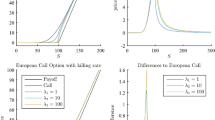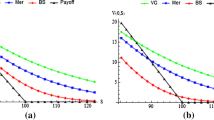Abstract
We construct and analyze a stable exponentially fitted numerical scheme for a degenerate parabolic equation in the zero-coupon bond pricing. Introducing weighted Sobolev spaces, we present the Gärding coercivity and the weak maximum principle for the differential solution. The differential problem is discretized by a fitted finite volume element method resolving the degeneration. We derive coercivity of the discrete bilinear form as we also show that the fully discrete system matrix is essentially of positive type which implies the maximum principle for the implicit time stepping. Numerical experiments validate the theoretical results.










Similar content being viewed by others
References
Achdou Y, Pironneau O (2005) Computational methods for option pricing. SIAM Ser Front Appl Math
Angermann L (2008) Discretization of the Black-Sholes operator with a natural left-hand side boundary condition. Far East J Appl Math 30(1):1–41
Angermann L, Wang S (2007) Convergence of a fitted finite volume method for the penalized Black-Sholes equation governing European and American option pricing. Numer Math 106:1–40
Bramble JH, Hubbard BE (1964) New monotone type approximations for elliptic problems. Math Comput 18(87):349–367
Bramble JH, Hubbard BE, Thomée V (1969) Convergence estimates for essentially positive type discrete Dirichlet problems. Math Comput 23:695–709
Bonnans J Fr, Tan X (2011) Monotonicity condition for the \(\theta \)-scheme for diffusion equations. INRIA, Raport de Recherche, No 7778
Cen Z, Le A (2011) A robust and accurate finite difference method for a generalized Black-Scholes equation. J Comput Appl Math 235:3728–3733
Chernogorova T, Stehlíková B (2012) A comparison of asymptotic formulae with finite-difference approximations for pricing zero coupon bond. Numer Algor 59:571–588
Chernogorova T, Valkov R (2011) Finite volume difference scheme for a degenerate parabolic equation in the zero-coupon bond pricing. Math Comput Model 54:2659–2671
Deng ZC, Yu JN, Yang L (2010) An inverse problem arizen in the zero bond pricing. Nonl Anal Real World Appls 11(3):1278–1288
Grossmann C, Roos H-G (2007) Numerical treatment of partial differential equations, 3d edn. Springer, Berlin
Gyulov T, Valkov R (2011) Classical and weak solutions for two models in mathematical finance. AIP Conf Proc 1410:195–202
Knabner P, Angermann L (2003) Numerical methods for elliptic and parabolic partial differential equations. Springer, New York
Kufner A (1985) Weighted Sobolev spaces. Wiley, New York
Lions J-L, Magenes E (1968) Problèmes aux Limites non Homogènes et Applications, vols. I and II. Dunod, Paris
Miller JJH, Wang S (1994) A new non-conforming Petrov-Galerkin finite element method with triangular elements for a singularly perturbed advection-diffusion problem. IMA J Numer Anal 14:257–276
Mikula K, Ševčovič D, Stehlíková B (2011) Analytical and numerical methods for pricing financial derivatives. Nova Science Publishers Inc., Hauppauge
Oleinik OA, Radkevich EV (1973) Second order equations with nonnegative characteristic form. Plenum Press, New York
Ramírez-Espinoza GI, Ehrhardt M (2013) Conservative and finite volume methods for the convection-dominated pricing problem. Adv Appl Math Mech 5(6):759–790
Stampfli J, Goodman V (2001) The Mathematics of Finance, Modeling and Hedgeing. Thomas Learning
Valkov R (2014) Fitted finite volume method for a generalized Black-Scholes equation transformed on finite interval. Numer Algor 65:195–220
Wilmott P, Howison S, Dewynne J (1995) The mathematics of financial derivatives. Cambridge University Press, Cambridge
Wang S (2004) A novel fitted volume method for the Black-Scholes equation governing option pricing. IMA J Numer Anal 24:699–720
Zhou HJ, Yiu KFC, Li LK (2011) Evaluating American put options on zero-coupon bonds by a penalty method. J Comput Appl Math 235:3921–3931
Zhu Y-I, Wu X (2004) Derivative securities and difference methods. Springer, Berlin
Acknowledgments
The authors are supported by the Sofia University Foundation under Grant No 106/2013. The first author is also supported by the European Social Fund through the Human Resource Development Operational Programme under contract BG051PO001-3.3.06-0052 (2012/2014). The second author is also supported by the Bulgarian National Fund under Project DID 02/37/09.
Author information
Authors and Affiliations
Corresponding author
Additional information
Communicated by Josselin Garnier.
Rights and permissions
About this article
Cite this article
Chernogorova, T., Valkov, R. Analysis of a finite volume element method for a degenerate parabolic equation in the zero-coupon bond pricing. Comp. Appl. Math. 34, 619–646 (2015). https://doi.org/10.1007/s40314-014-0128-9
Received:
Revised:
Accepted:
Published:
Issue Date:
DOI: https://doi.org/10.1007/s40314-014-0128-9
Keywords
- Degenerate parabolic equation
- Gärding coercivity
- Finite volume element method
- M-matrix
- Stability
- Convergence




